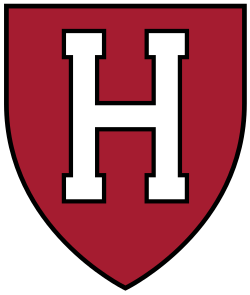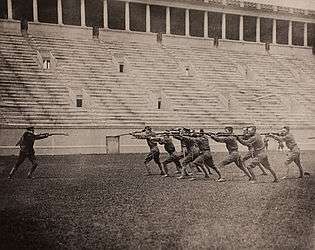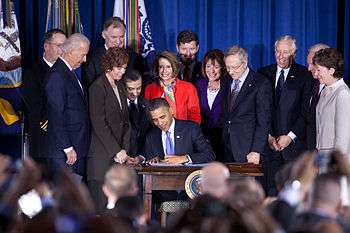Harvard ROTC
Harvard ROTC was one of the first Reserve Officers' Training Corps (ROTC) units in the country, founded in 1916.[1] The original program was led by Captain Constant Cordier.[2][3] By the fall of 1952 forty percent of the incoming freshmen class at Harvard University enrolled in programs that led to a ROTC commission.
| Harvard ROTC | |
|---|---|
 | |
| Active | Founded in 1916 |
| Country | United States of America |
| Allegiance | United States Navy, United States Army |
| Role | Officer Training |
| Garrison/HQ | Cambridge, Massachusetts |

_the_Honorable_Ray_Mabus%2C_left%2C_and_Harvard_President_Drew_Faust_sign_a_Memorandum_of_Agre.jpg)

Harvard has the third most graduates who have received the Medal of Honor. With eighteen recipients, only West Point and the US Naval Academy have more.[4]
In 1969, in the middle of sometimes violent protests over the Vietnam War, Harvard downgraded the status of ROTC to an extracurricular activity. The cited reason was over academic standards on coursework.[5] The military’s official departure from Harvard began in the years that followed.[6][7] For the next several decades Harvard’s connection to ROTC was by allowing their students to take ROTC courses at Massachusetts Institute of Technology.
By 1994, in the midst of the controversy over the Don’t Ask Don’t Tell (DADT) law on homosexuality, Harvard committed to upholding ROTC ties, but only through indirect alumni contributions. This compromise prevented all ties from being severed as was recommended in the 1992 faculty committee report.[8][9]
Harvard University President Drew Faust promised a return of ROTC to campus, once DADT was repealed, in a speech with Chairman of the Joint Chiefs Admiral Mike Mullen at the Kennedy School of Government on 17 November 2010.[10] In December 2010 Congress passed a bill to repeal President Bill Clinton’s 1993 DADT Policy.
On March 4, 2011, Harvard University President Drew Faust signed an agreement with Navy Secretary Ray Mabus formally recognizing the return of Naval ROTC to Harvard’s campus.[11][12] According to the agreement's terms, a Director of Naval ROTC would be appointed, and Harvard would provide funding for the program. The Navy agreement was structured to go into effect when the repeal of DADT was implemented, and was followed by a similar agreement with the Army.[13][14] President Barack Obama, who in his 2011 State of the Union address called on all universities to open their doors to ROTC,[15] responded through his spokesman by saying:
With our nation at war, this sends a powerful message that Americans stand united and that our colleges, society and armed forces are stronger when we honor the contributions of all our citizens, especially our troops and military families who sacrifice for our freedoms. As the president said in the State of the Union, it is time to move forward as one nation.
— Jay Carney, President Obama’s Spokesman[16]
Harvard Medal of Honor recipients
| Name | Rank | Service | Conflict | School [4] |
|---|---|---|---|---|
| Manning F. Force | Major General | US Army | American Civil War | Harvard College (1845) and Harvard Law School (1848) |
| Charles E. Phelps | Brigadier General | US Army | American Civil War | Harvard Law School (1853) |
| Horace Porter | Brigadier General | US Army | American Civil War | Harvard Lawrence Scientific School (1857) |
| Richard J. Curran | Major | US Army | American Civil War | Harvard Medical School (1859) |
| Henry Shippen Huidekoper | Major General | US Army | American Civil War | Harvard College (1862) |
| Hazard Stevens | Brigadier General | US Army | American Civil War | Harvard College (1865) |
| Henry W. Lawton | General | US Army | American Civil War | Harvard Law School (1866) |
| Wilmon W. Blackmar | Brigadier General | US Army | American Civil War | Harvard Law School (1867) |
| Leonard Wood | General | US Army | Apache Campaign | Harvard Medical School (1884) |
| Theodore Roosevelt | Colonel | US Army | Spanish–American War | Harvard College (1880) |
| Walter Hill | Brigadier General | US Marine Corps | VeraCruz, Mexico | Harvard College (1880) |
| George G. McMurtry | Major | US Army | World War I | Harvard College (1899) |
| Charles W. Whittlesey | Lieutenant Colonel | US Army | World War I | Harvard Law School (1908) |
| Claud A. Jones | Rear Admiral | US Navy | USS Memphis (CA-10) destroyed near Santo Domingo City | Harvard Graduate School of Applied Science (1913) |
| Pierpont M. Hamilton | Major General | US Air Force | World War II | Harvard College (1920) |
| Theodore Roosevelt II | Brigadier General | US Army | World War II | Harvard College (1909) |
| Sherrod E. Skinner | 2nd Lieutenant | US Marine Corps | Korean War | Harvard College (1951) |
| Robert C. Murray | Staff Sergeant | US Army | Vietnam War | Harvard Business School (1970) |
Notable alumni
Anthony G. Brown, Harvard College (1984) and Harvard Law School (1992), U.S. Representative (MD-4) and Colonel in the U.S. Army Reserve
Paul G. Kirk, Harvard College (1960) and Harvard Law School (1964), Chairman of the Democratic National Committee (1985-1989), U.S. Senator from Massachusetts (2009-2010)
Eliot Asher Cohen, Harvard College (1977) and Harvard University (Ph.D. 1982), Counselor in the U.S. Department of State (2007-2009), Director of the Strategic Studies Program at the Paul H. Nitze School of Advanced International Studies of the Johns Hopkins University
References
- "The Harvard Veterans History Project". Archived from the original on 2011-06-21. Retrieved 2011-04-19.
- Harvard Crimson 3 January 1916: Captain Cordier in Command
- Harvard Crimson 23 September 1916: Reserve Force Proposed
- Advocates for Harvard ROTC: Medal of Honor Recipients from Harvard University
- What to Do About ROTC: Extract from the Minutes of Special Meeting of the Faculty of Arts and Sciences, Harvard University, February 4, 1969
- Harvard Crimson 12 August 1969: Army Plans to Terminate Harvard ROTC in 1970; Air Force Stays Until '71
- 23 June 1971: Letter from the Office of the Chief of Naval Personnel to the Commanding Officer of the Harvard NROTC Unit on its Disestablishment
- 2 October 1992: Report of the Harvard University Committee on the Status of ROTC
- Harvard Crimson 1 December 1994: Report Upholds ROTC Tie, But Without Direct Funding
- Harvard Crimson 18 November 2010: Drew Faust Endorses Return of ROTC
- Harvard Crimson 4 March 2011: Harvard Signs Agreement To Officially Recognize Naval ROTC
- Advocates for Harvard ROTC article 4 March 2011: Harvard - Navy ROTC Agreement Signed
- Harvard Crimson 22 March 2012: After 43 Years, Army Welcomed in Harvard Yard Once More
- Advocates for ROTC article 28 March 2012: Harvard Army ROTC Office Opening Ceremony
- 25 January 2011: Remarks by the President in State of Union Address
- url=http://www.defense.gov/news/newsarticle.aspx?id=63043%7Ctitle=Obama Spokesman Applauds ROTC Return to Harvard